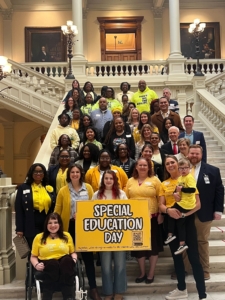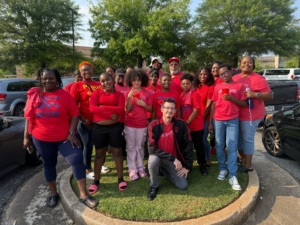Five years ago, I launched Empowered Parents Invested in Change (EPIC) to give parents the tools to become effective education advocates. In 2020, at the height of the pandemic, I logged onto Zoom for our first training, unsure if anyone would join. More than 60 parents showed up, eager to engage.
Since then, EPIC has grown into a critical part of our advocacy strategy, bringing together parent leaders across Georgia and transforming how we approach parent engagement. We learned that investing in parent voices is a long-term commitment that requires patience, trust and intentionality.
Today, EPIC has graduated over 542 parents from 102 counties, and its impact continues to grow. Since 2021 our graduates have helped to pass numerous bills for GeorgiaCAN. I wanted to share some key insights and impacts we have had since starting this program.
-
Equip parents with the tools they need.
Parents are the true changemakers. After completing the training, participants engaged with our network at higher rates, and this investment gave them the first steps in their advocacy journeys. We saw this clearly in our work around special education.
Take the story of Chelsea Hutchings (Gwinnett County, Cohort 8). Her journey began when her child was removed from his home school and forced to attend another school out of the cluster. Without EPIC, she would not have received the basic knowledge she needed to engage with lawmakers. Through her training, Chelsea began to understand the importance of inclusive education and built the confidence to push lawmakers to recognize and address these issues.
Last year, Chelsea and several other parents in our network launched the first-ever Special Education Day at the State Capitol. More than 60 parents joined together to share their experiences with lawmakers and advocate for improvements in special education across public schools.
-
Build long-term relationships.
Opportunities to learn and build the trust needed to collaborate on new policy ideas and organizing strategies. Some of our strongest advocates came from our very first EPIC cohort and they continue to engage lawmakers today.
One example is Patricia Nealy (Clayton County, Cohort 1). I first met Patricia at a Starbucks on Tara Blvd. just before the pandemic began. She shared her son’s education journey with me and described the countless attempts she made to find him the right learning environment. Patricia also spoke about the urgent need to reform the Georgia Special Needs Scholarship and to create an appeals process for parents who believed the calculation was incorrect.
Her advocacy helped lead to SB 42, which expanded the Georgia Special Needs Scholarship and established an appeals process. Over the years, Patricia has built a powerhouse parent movement in Clayton County, helped launch two charter schools, and has taken more actions than anyone else in our parent network. EPIC was the launchpad for her work to change education in Georgia.
-
Expand our geographic footprint
Before EPIC, our team spent countless hours traveling across the state to reach families in communities that deeply needed our toolkits. Moving to a virtual platform allowed us to grow quickly, to engage the most committed advocates, and to develop a roadmap focused on in-person engagement.
There are two communities in particular where we have built an especially strong network of advocates.
The first is Columbus, Georgia, the second-largest city in our state and home to EPIC leader Denise Cambridge (Cohort 2, Muscogee County). Denise often jokes that she used to “stalk” our advocacy work before joining EPIC, but the program became the tipping point for her leadership journey. She completed the course in 2021, then became a parent fellow for our organization. Today serves as both the EPIC and Parent Fellowship leader at GeorgiaCAN. Through her work, she has helped expand our organization’s footprint beyond Metro Atlanta and strengthened our presence in Columbus. Thanks to her organizing skills and dedicated engagement to local parents, our Muscogee network secured a key win with the addition of the district’s parent advisory council to its rezoning project.
The second is Augusta, Georgia, where in 2023 Jacquetta Williams (Cohort 6, Richmond County) emerged as a powerful advocate and organizer. Jacquetta shined a light on the poor academic performance of students in the community and pushed for greater opportunities to innovate at the district level. She went on to host our first dialogue with a superintendent about the possibility of adopting a year-round school schedule. Jacquetta later passed the work to Patricia Sonnier (Cohort 3, Columbia County), who continued to lead a growing network of parent advocates in the CSRA.. Together, Jacquetta and Patricia have continued to push for change, including supporting the approval of the first locally authorized charter school in Richmond County and by supporting our first EPIC graduate elected to the school board in that community.
-
Recognize that we are part of their journey, not the destination.
Many parents have allowed the EPIC training to serve as a springboard to launch their own advocacy campaigns. By continuing to support them without pressuring them to exclusively advance GeorgiaCAN’s priorities we have undoubtedly strengthened both their efforts and ours.
We saw this with Loreal Burns (Cohort 9, Cobb County). After her experience with EPIC, she became more deeply rooted in her local community. She launched Parents on Point Cobb, a movement that united the county around common-sense education policy while creating a platform of support and resources.
Her powerful leadership went even further by sparking similar efforts in DeKalb, Bibb, and Chatham Counties, showing the powerful ripple effect that one parent’s advocacy can have in transforming communities across the state.
-
Deepen relationships with elected leaders
Building a team of advocates is vital to our work, and it empowers parents to connect directly with leaders in power.
Kelly Fields (Cohort 7, Hall County) provides an excellent example of this. After EPIC, Kelly’s passion centered on advancing the Georgia Promise Scholarship. She shared with me how, throughout the fall 2023, she began calling members of the House of Representatives one by one. She asked each of them why they didn’t support the Promise Scholarship and continued the conversation by then asking what she could do to help them move the bill forward. Kelly also worked to connect parents and students with lawmakers, encouraging them to keep the pressure on and push for change. Her determination was one of the most important reasons this program exists today.
We also saw this same spirit in Ophelia Nnorom (Cohort X, Clayton County). She played a critical role in securing the first local charter school approval in seven years for Clayton County. Ophelia worked tirelessly to ensure school board members understood why Tapestry Public Charter School was essential for the district. Her testimony ultimately became the tipping point that moved the board to vote in support of the school.
EPIC has 5 impactful years that is proven by the demonstrated efforts of power in actions resulting from the investment of parents as leaders. What began as a pilot program has become a cornerstone of our approach to change: long-term, relationship-driven, and led by parents themselves.


